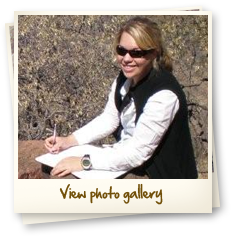

The earliest I can remember taking an interest in natural history comes from a class project in the 1st grade at elementary school in my hometown of Oxford, Nova Scotia. The entire class built a replica of a stegosaurus made out of wire and paper-mâché . Afterwards, I was sure I wanted to be a palaeontologist.
Although my interest in dinosaurs and fossils waned over the years, I remained interested in the natural history of the Earth and knew that I wanted a career involving the outdoors.
In between college terms I got my first Earth Science-related job at the Fundy Geological Museum in Parrsboro, Nova Scotia. I couldn't believe that someone was willing to pay me to go the beach everyday and talk about rocks and fossils to people from all over the world. This experience widened my eyes and I wondered what else I could do and where else I could go to do this sort of work.
Although there are many different career paths within the Earth Sciences, I chose to specialize in geological mapping. As a mapper it is my job to look at and interpret a given area, usually as part of a team, and produce a geological map summarizing the findings. Since my first job at the Fundy Geological Museum, I've been fortunate enough to have mapped rocks in a huge range of environments from the vast plains of Arctic tundra on Baffin Island, Nunavut to razor-back mountain ridgelines of the Kluane Ranges in Yukon. My career as a mapper has also taken me to the rugged Australian outback, and to the edge of the Kalahari Desert in Africa.
A career in Earth Sciences has provided me with the opportunity to enjoy an outdoors "office" and travel off the beaten track around the world.
 Q: What is the title of your job and what do you do?
Q: What is the title of your job and what do you do?A: Consulting Geologist. Geological mapping and project management.
A: Self-employed. Based in Oxford, Nova Scotia.
A: In an office atmosphere I work a standard 5 day week, 9 am to 5 pm. In the field, work hours vary due to weather and other unforeseen delays, but usually are 10-12 hours long.
A: I have an office in Oxford, Nova Scotia and work in the field all over the world.
A: Personal gear includes maps, compass, GPS, camera, and various geological tools. In the field we use 4x4 vehicles and helicopters for transportation.

A: Usually a minimum of a university degree (Bachelor of Science in geology).
A: A love for the outdoors (and everything that goes with it - bugs, animals, trees, etc). Adventurous. Independent.
A: $75,000+ / year
A: Travelling and learning about different geological environments around the world
A: Meeting new people (either as team members or as local residents); seeing different geologic formations from all around the world; experiencing different cultures while working in an area; amassing a world-wide collection of rock
 Q: What are the advancement opportunities for this career?
Q: What are the advancement opportunities for this career? A: As a self-employed individual, I could grow my company by hiring other consultants to be part of my team.
A: Field work can sometimes be quite strenuous. For example, mapping rocks in mountainous terrain is physically demanding. Mapping in 40+ degree heat can also be physically demanding.
A: An interest in the outdoors and natural history, and a desire to have travel as part of my career.
A: Mapping in the Kluane Ranges with the Yukon Geological Survey. The rocks were really interesting and we saw a lot of grizzly bears and mountain sheep while mapping. The scenery was spectacular.
A: Get as much field experience as you can. Actually looking at the rocks in the field (versus the classroom) is the best way to learn.